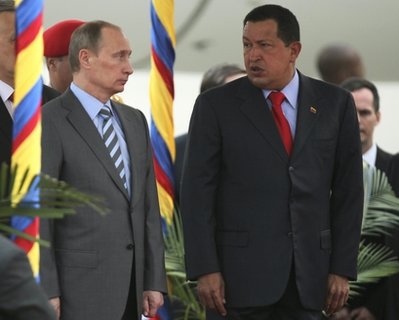
CARACAS, Venezuela – Russia has offered to help Venezuela set up its own space industry, including a satellite launch site, as Prime Minister Vladimir Putin makes his first visit to the South American country.
Venezuelan President Hugo Chavez announced Russia’s offer before Putin arrived Friday, saying officials would discuss the possibility of setting up a “satellite launcher and a factory.” Chavez didn’t give details or say how much that might cost.
The two countries are also discussing weapons deals, some of which are new, Chavez said Thursday night in televised remarks, without giving details.
Chavez has built close ties with Russia in recent years and has bought more than $4 billion in Russian weapons since 2005, including helicopters, fighter jets and 100,000 Kalashnikov rifles.
Russian and Venezuelan officials also planned to sign new agreements for energy projects in Venezuela, as well as industrial, commercial and agriculture projects.
Chavez also reiterated that Russia will help Venezuela develop nuclear energy — a plan he has mentioned previously that has yet to take shape.
“We aren’t going to make an atomic bomb, but we are going to develop atomic energy with peaceful aims,” he said. Chavez, whose country is a major oil exporter and OPEC member, says “we have to prepare ourselves for the post-oil era.”
After welcoming Putin at the airport, Chavez accompanied the Russian leader on a tour of a Russian Navy ship that is paying a port call in Venezuela.
Political analysts in Moscow say Russia is drawn to Venezuela because of the its anti-U.S. rhetoric above everything else, but they also note that business deals have helped cement the growing relationship.
“The only thing that really unites Russia and Venezuela is that they don’t want to see a unipolar world,” dominated by the U.S., said Sergei Mikheyev, an analyst at the Center for Political Technologies, adding that President Barack Obama’s administration hasn’t done enough to lure Moscow away from Caracas.
Obama says he is committed to a “reset” of the U.S. relationship with Russia, but Mikheyev said “the Americans haven’t compromised with Russia on any significant issue … so it makes no sense for them (the Russians) to change priorities.”
Mikheyev noted that the United States has so far failed to react to Russia’s plea to cut drug traffic from Afghanistan to Russia’s Central Asian borders. Russia has also spent years trying to convince the U.S. to scrap Cold War measures that have restricted U.S.-Russia trade.
Venezuela is also a very lucrative arms and technology market for Russia, however, and Mikheyev said “without the business involved, the anti-American rhetoric wouldn’t be enough to unite Russia and Venezuela”.